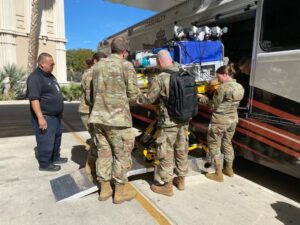
By Bernard S. Little
WRNMMC Command Communications
Walter Reed provides safe and quality care to all its beneficiaries, including the youngest warriors – children of the men and women who serve in uniform.
To provide the best care, those who treat Walter Reed’s young patients receive world-class training and conduct innovative research in pediatrics.
Several Walter Reed Neonatal Intensive Care Unit (NICU) faculty and fellows recently presented their work at the Conference on Military Perinatal Research (COMPRA). The conference in San Antonio annually celebrates tri-service research in neonatal-perinatal medicine, explained Air Force Lt. Col. (Dr.) Elizabeth Schulz, a neonatologist at Walter Reed who also serves as an associate professor of pediatrics at the Uniformed Services University (USU). She also directs the neonatology fellowship program for the National Capital Consortium/WRNMMC. The NCC includes graduate medical education programs in the national capital region, including those at Walter Reed, USU, and the Alexander T. Augusta Military Medical Center at Fort Belvoir, Virginia.
The theme for the 2023 COMPRA, held Nov. 6-7, was “Quality & Safety,” Schultz added. Neonatology staff or fellows from Walter Reed who presented at the conference included:
• Schulz, who presented on the “Military History of Guam and its Current Perinatal Public Health Crisis
• Army Maj. (Dr.) J Min Hwang, a neonatologist, who presented on behalf of Army Capt. (Dr.) Elizabeth Ketchum, a neonatology fellow, on the topic Number of intubation attempts on the incidence of server intraventricular hemorrhage (IVH). “As the field of neonatology improves, more infants born with lower birthweights and at lower gestational ages are surviving – but it is these infants who are most at risk for serious neonatal morbidities, to include IVH. It is well known that IVH is a significant predictor of individual morbidity and mortality and is associated with long-term neurologic impairments. However, there is very limited data on what modifiable factors place these infants at highest risk. The outcomes from this study have the potential to add to the growing body of literature addressing modifiable practices aimed at decreasing the incidence of IVH,” Ketchum and her fellow authors of the study explained.
• Army Maj. (Dr.) Christopher Stark, a neonatology fellow, who presented Maternal and fetal health risks among female military aviation officers. “Military aviation poses unique occupational risks, including exposures to intermittent hypoxia, high gravitational force, toxic materials, loud noise, whole-body vibrations, and cosmic radiation. The purpose of this study is to investigate whether a female military aviation officer career is associated with adverse maternal or fetal health outcomes,” stated the study authors.
• Navy Lt. Cmdr. (Dr.) Jennifer Bencze, a neonatology fellow, presented The effect of synaptamide treatment on neurogenesis of mice prenatally exposed to ethanol. “Fetal alcohol spectrum disorder (FASD), caused by prenatal exposure to ethanol, is currently an untreatable disorder that affects children around the world. This ongoing study suggests that impairment of neurogenesis due to fetal ethanol exposure can be reversed by prenatal maternal treatment with synaptamide,” shared the study authors.
• Air Force Capt. (Dr.) Joel Toro, a neonatology fellow presented Behavioral studies on docosahexaenoic acid (DHA) deficit mice. “Docosahexaenoic acid (DHA) is an omega-3 fatty acid that is essential for brain development and has been shown to have a role in cognitive and memory function. G-protein coupled receptors (GPCR) are important drug targets and major regulators of intracellular signaling. These tests will help detect any behavioral changes in the mice that would be related to the developmental changes between the wild type and GPR110 KO mice,” Toro stated.
“The conference, hosted by the American Academy of Pediatrics, aims to bring together tri-service individuals from around the globe and in training to learn what research is currently being conducted in our patient population by active-duty researchers,” Schultz said. “It is a collaboration and networking opportunity with historical significance.”
Schultz also shared that former Air Force neonatologists created ventilators that have been modernized and still used today, and COMPRA includes lectures and training in pediatric patient transportation to honor those individuals.
“The military-specific transport course [at COMPRA] aims to teach the team of health care providers who will be caring for critically ill neonates in flight,” Schultz explained. “These could include long, multi-nation, fixed-wing flights to bring our tiniest heroes delivered or cared for in austere environments or remote duty locations, back to resources and subspecialties in the continental United States.” She said the course includes training in flight physiology, disease considerations during transport, hands-on transport equipment training, and simulations with ground transport.
Schultz added that some of the other topics discussed during the conference addressed the NICU “Golden Hour,” standardizing discharge recommendations for NICU patients, how neonatologists offer choices to parents during consultations for reliable deliveries, neonatal hypoglycemia screening practices, and the use of donor human milk within well newborn nurseries and NICUs.